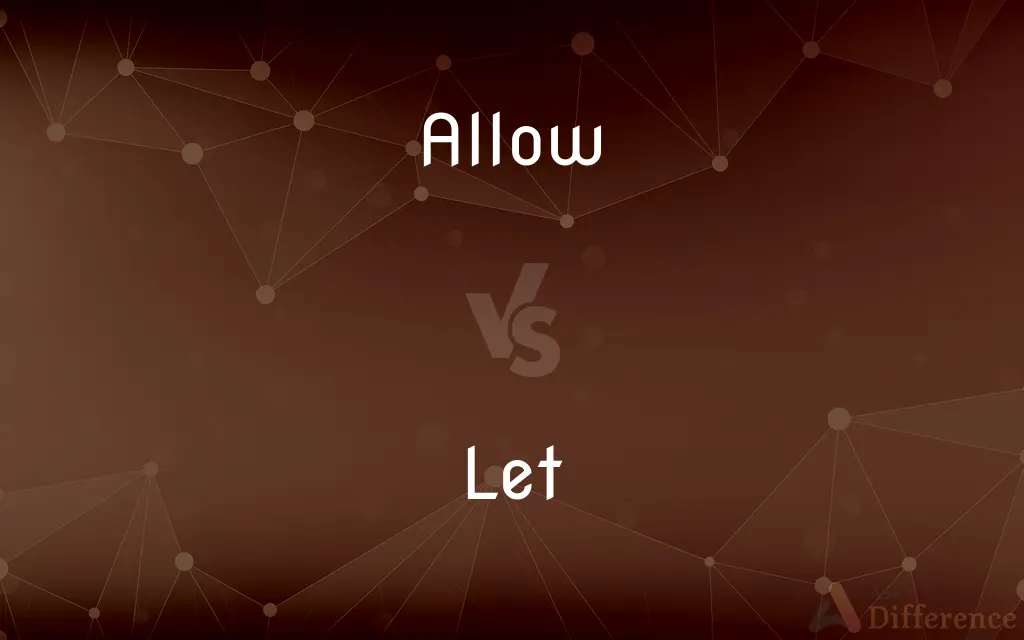Allow vs. Let — What's the Difference?
By Fiza Rafique & Urooj Arif — Updated on March 7, 2024
Allow focuses on permission from a position of authority, while let implies a more informal or passive permission.

Difference Between Allow and Let
Table of Contents
ADVERTISEMENT
Key Differences
Allow often comes from a position of authority or formal permission, suggesting an active decision to permit something. Let, on the other hand, implies a more passive or informal type of permission. It often suggests that the person giving permission is not obstructing an action rather than actively enabling it.
Allow used in contexts where rules, laws, or policies are involved, and granting permission can sometimes involve certain conditions or stipulations. For example, parents allow their children to go out with friends, but only if homework is completed. This distinction becomes clear in casual, everyday situations. For instance, a friend might let you borrow a book, indicating a simple, informal agreement without conditions.
The context in which allow and let are used can significantly affect their meaning. While "allow" often carries a tone of formal permission, "let" is more likely used in everyday, informal contexts. This difference is especially evident in legal or official documents where "allow" is preferred to denote permission within the confines of rules or regulations.
In terms of connotation, allow suggests a certain level of scrutiny or consideration before giving permission, as it often involves evaluating conditions or potential outcomes. On the other hand, let conveys a more spontaneous or gracious granting of permission, without the implication of rigorous evaluation.
Despite these differences, allow and let are sometimes used interchangeably in casual speech. This interchangeability shows the flexibility of English language usage, where context and intonation can adjust the level of formality or authority implied by these terms.
ADVERTISEMENT
Comparison Chart
Formality
More formal, often used in official permissions.
Less formal, used in casual or informal settings.
Authority Level
Implies a higher level of authority or control.
Implies a more passive or egalitarian stance.
Conditions
May include conditions or stipulations.
Generally unconditional or with fewer conditions.
Context
Common in legal, professional, or policy contexts.
Frequently used in personal or casual contexts.
Connotation
Can suggest deliberation or restriction.
Often conveys a sense of freedom or ease.
Compare with Definitions
Allow
To give permission or make it possible for something to happen.
The law allows citizens to speak freely.
Let
To cause or allow something to be seen or known.
Let your creativity shine.
Allow
To permit someone to do something by not preventing it.
Her parents allow her to travel alone.
Let
To permit something to happen or someone to do something by not interfering.
Let the children play outside.
Allow
To make provision or consideration for something.
The system allows for easy upgrades.
Let
To rent out property.
They let their apartment to a young couple.
Allow
In the context of time or resources, to allocate a certain amount.
Allow at least an hour for the interview.
Let
In games, a term indicating an action must be redone, such as a serve in tennis.
The serve was a let.
Allow
To acknowledge or admit something.
You must allow that it was partly your fault.
Let
To make it possible or easier for something to be done.
This door lets more light into the room.
Allow
To let do or happen; permit
We allow smoking only in restricted areas.
Let
To give permission or opportunity to; allow
I let them borrow the car. The inheritance let us finally buy a house. See Usage Note at leave1.
Allow
To permit the presence of
No pets are allowed inside.
Let
To cause to; make
Let the news be known.
Allow
To permit to have
Allow oneself a little treat.
Let
Used as an auxiliary in the imperative to express a command, request, or proposal
Let's finish the job! Let x equal y.
Allow
To make provision for; assign
The schedule allows time for a coffee break.
Let
Used as an auxiliary in the imperative to express a warning or threat
Just let her try!.
Allow
To plan for in case of need
Allow two inches in the fabric for shrinkage.
Let
To permit to enter, proceed, or depart
Let the dog in.
Allow
To grant as a discount or in exchange
Allowed me 20 dollars on my old typewriter.
Let
To release from or as if from confinement
Let the air out of the balloon.
Let out a yelp.
Allow
To admit; concede
I allowed he was right.
Let
To rent or lease
Let rooms.
Allow
To think; suppose
"We allow he's straight" (American Speech).
Let
To award, especially after bids have been submitted
Let the construction job to a new firm.
Allow
To assert; declare
Mother allowed that we'd better come in for dinner.
Let
To become rented or leased.
Allow
To offer a possibility; admit
The poem allows of several interpretations.
Let
To be or become assigned, as to a contractor.
Allow
To take a possibility into account; make allowance
In calculating profit, retailers must allow for breakage and spoilage.
Let
To hinder or obstruct.
Allow
(transitive) To grant, give, admit, accord, afford, or yield; to let one have.
To allow a servant his liberty;
To allow a free passage;
To allow one day for rest
Let
Something that hinders; an obstacle
Free to investigate without let or hindrance.
Allow
(transitive) To acknowledge; to accept as true; to concede; to accede to an opinion.
To allow a right;
To allow a claim;
To allow an appeal
To allow the truth of a proposition
Let
(Sports) An invalid stroke in tennis and other net games that requires a replay.
Allow
(transitive) To grant (something) as a deduction or an addition; especially to abate or deduct.
To allow a sum for leakage.
Let
(transitive) To allow to, not to prevent to}}.
After he knocked for hours, I decided to let him come in.
Allow
(transitive) To grant license to; to permit; to consent to.
To allow a son to be absent.
Smoking allowed only in designated areas.
Let
(transitive) To allow to be or do without interference; to not disturb or meddle with; to leave (someone or something) alone.
Let me be!
Allow
To not bar or obstruct.
Although I don't consent to their holding such meetings, I will allow them for the time being.
Let
(transitive) To allow possession of (a property etc.) in exchange for rent.
I decided to let the farmhouse to a couple while I was working abroad.
Allow
(transitive) To take into account by making an allowance.
When calculating a budget for a construction project, always allow for contingencies.
Let
(transitive) To give, grant, or assign, as a work, privilege, or contract; often with out.
To let the building of a bridge;
To let out the lathing and the plastering
Allow
(transitive) To render physically possible.
Let
Used to introduce a first or third person imperative verb construction.
Let's put on a show!
Let us have a moment of silence.
Let me just give you the phone number.
Let P be the point where AB and OX intersect.
Allow
To praise; to approve of; hence, to sanction.
Let
To cause + bare infinitive.
Can you let me know what time you'll be arriving?
Allow
(obsolete) To sanction; to invest; to entrust.
Let
(archaic) To hinder, prevent, impede, hamper, cumber; to obstruct (someone or something).
Allow
To like; to be suited or pleased with.
Let
(obsolete) To prevent someone from doing something; also to prevent something from happening.
Allow
To decide (a request) in favour of the party who raised it; to grant victory to a party regarding (a request).
To allow an objection, to find in favour of the objection and forbid the conduct objected to; to allow an appeal, to decide the appeal in favour of the appellant (contrast grant leave to appeal, to permit an appeal to be heard).
Let
(obsolete) To tarry or delay.
Allow
To praise; to approve of; hence, to sanction.
Ye allow the deeds of your fathers.
We commend his pains, condemn his pride, allow his life, approve his learning.
Let
The allowing of possession of a property etc. in exchange for rent.
Allow
To like; to be suited or pleased with.
How allow you the model of these clothes?
Let
An obstacle or hindrance.
Allow
To sanction; to invest; to intrust.
Thou shalt be . . . allowed with absolute power.
Let
(tennis) The hindrance caused by the net during serve, only if the ball falls legally.
Allow
To grant, give, admit, accord, afford, or yield; to let one have; as, to allow a servant his liberty; to allow a free passage; to allow one day for rest.
He was allowed about three hundred pounds a year.
Let
To retard; to hinder; to impede; to oppose.
He was so strong that no man might him let.
He who now letteth will let, until he be taken out of the way.
Mine ancient wound is hardly whole,And lets me from the saddle.
Allow
To own or acknowledge; to accept as true; to concede; to accede to an opinion; as, to allow a right; to allow a claim; to allow the truth of a proposition.
I allow, with Mrs. Grundy and most moralists, that Miss Newcome's conduct . . . was highly reprehensible.
Let
To leave; to relinquish; to abandon.
He . . . prayed him his voyage for to let.
Yet neither spins nor cards, ne cares nor frets,But to her mother Nature all her care she lets.
Let me alone in choosing of my wife.
Allow
To grant (something) as a deduction or an addition; esp. to abate or deduct; as, to allow a sum for leakage.
Let
To consider; to think; to esteem.
Allow
To grant license to; to permit; to consent to; as, to allow a son to be absent.
Let
To cause; to make; - used with the infinitive in the active form but in the passive sense; as, let make, i. e., cause to be made; let bring, i. e., cause to be brought.
This irous, cursed wretchLet this knight's son anon before him fetch.
He . . . thus let do slay hem all three.
Anon he let two coffers make.
Allow
To admit; to concede; to make allowance or abatement.
Allowing still for the different ways of making it.
Let
To permit; to allow; to suffer; - either affirmatively, by positive act, or negatively, by neglecting to restrain or prevent.
Pharaoh said, I will let you go.
If your name be Horatio, as I am let to know it is.
Allow
Make it possible through a specific action or lack of action for something to happen;
This permits the water to rush in
This sealed door won't allow the water come into the basement
This will permit the rain to run off
Let
To allow to be used or occupied for a compensation; to lease; to rent; to hire out; - often with out; as, to let a farm; to let a house; to let out horses.
Allow
Consent to, give permission;
She permitted her son to visit her estranged husband
I won't let the police search her basement
I cannot allow you to see your exam
Let
To give, grant, or assign, as a work, privilege, or contract; - often with out; as, to let the building of a bridge; to let out the lathing and the plastering.
Allow
Let have;
Grant permission
Mandela was allowed few visitors in prison
Let
To forbear.
Allow
Give or assign a share of money or time to a particular person or cause;
I will earmark this money for your research
Let
A retarding; hindrance; obstacle; impediment; delay; - common in the phrase without let or hindrance, but elsewhere archaic.
Consider whether your doings be to the let of your salvation or not.
Allow
Make a possibility or provide opportunity for; permit to be attainable or cause to remain;
This leaves no room for improvement
The evidence allows only one conclusion
Allow for mistakes
Leave lots of time for the trip
This procedure provides for lots of leeway
Let
A stroke in which a ball touches the top of the net in passing over.
Allow
Allow or plan for a certain possibility; concede the truth or validity of something;
I allow for this possibility
The seamstress planned for 5% shrinkage after the first wash
Let
The most brutal terrorist group active in Kashmir; fights against India with the goal of restoring Islamic rule of India;
Lashkar-e-Toiba has committed mass murders of civilian Hindus
Allow
Afford possibility;
This problem admits of no solution
This short story allows of several different interpretations
Let
A serve that strikes the net before falling into the receiver's court; the ball must be served again
Allow
Allow the other (baseball) team to score;
Give up a run
Let
Make it possible through a specific action or lack of action for something to happen;
This permits the water to rush in
This sealed door won't allow the water come into the basement
This will permit the rain to run off
Allow
Grant as a discount or in exchange;
The camera store owner allowed me $50 on my old camera
Let
Actively cause something to happen;
I let it be known that I was not interested
Allow
Allow the presence of or allow (an activity) without opposing or prohibiting;
We don't allow dogs here
Children are not permitted beyond this point
We cannot tolerate smoking in the hospital
Let
Consent to, give permission;
She permitted her son to visit her estranged husband
I won't let the police search her basement
I cannot allow you to see your exam
Let
Cause to move; cause to be in a certain position or condition;
He got his squad on the ball
This let me in for a big surprise
He got a girl into trouble
Let
Leave unchanged;
Let it be
Let
Grant use or occupation of under a term of contract;
I am leasing my country estate to some foreigners
Common Curiosities
Can "let" imply conditions like "allow"?
Rarely, "let" usually implies permission without strict conditions, whereas "allow" might have stipulations.
Are there contexts where only "allow" or "let" is appropriate?
Yes, "allow" fits formal or legal contexts, while "let" is suited for casual or informal situations.
Can "allow" and "let" be used without an object?
No, both verbs typically require an object to indicate what is being permitted.
Is "allow" more formal than "let"?
Yes, "allow" is typically more formal and used in official or structured contexts.
Does "allow" always imply permission from a higher authority?
Often, but not always, depending on context and the nature of the permission given.
Do "allow" and "let" have different origins?
Yes, their etymologies differ, reflecting their usage and connotations over time.
Can "let" be used in a legal context?
Less commonly, "allow" is preferred in legal or official documentation for clarity.
Is "let" always informal?
Mostly, though its usage can slightly vary in formality depending on context.
Can "allow" and "let" be used interchangeably?
Yes, in casual speech, but their formality and context can differ.
Is it correct to use "allow" in casual conversation?
Yes, but "let" might be preferred for its more informal connotation.
Can the use of "allow" or "let" change the tone of a sentence?
Yes, "allow" can make a sentence sound more formal or authoritative, while "let" is more casual.
Are there synonyms that can replace "allow" or "let" without changing the sentence's meaning?
Yes, but the choice of synonym can affect the sentence's formality and nuance.
How does the use of "allow" or "let" affect legal documents?
The choice can affect the clarity, formality, and interpretability of permissions or conditions stated.
Does "let" have meanings unrelated to permission?
Yes, such as its use in sports or real estate contexts.
How do cultural differences affect the use of "allow" and "let"?
Cultural nuances can influence the preference and perception of formality and authority implied by each term.
Share Your Discovery

Previous Comparison
Bug vs. Nug
Next Comparison
Gliadin vs. GlutinAuthor Spotlight
Written by
Fiza RafiqueFiza Rafique is a skilled content writer at AskDifference.com, where she meticulously refines and enhances written pieces. Drawing from her vast editorial expertise, Fiza ensures clarity, accuracy, and precision in every article. Passionate about language, she continually seeks to elevate the quality of content for readers worldwide.
Co-written by
Urooj ArifUrooj is a skilled content writer at Ask Difference, known for her exceptional ability to simplify complex topics into engaging and informative content. With a passion for research and a flair for clear, concise writing, she consistently delivers articles that resonate with our diverse audience.















































